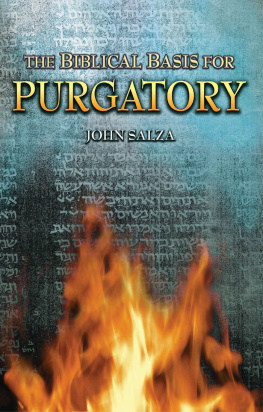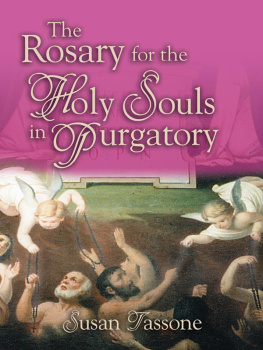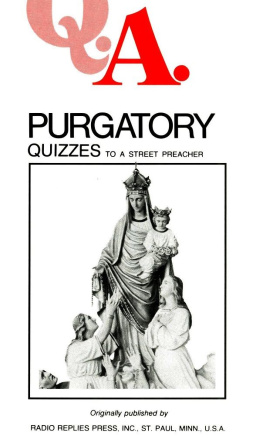Originally published in 1971 by Schenkman Publishing Company
Published 2006 by Transaction Publishers
Published 2017 by Routledge
2 Park Square, Milton Park, Abingdon, Oxon OX14 4RN
711 Third Avenue, New York, NY 10017, USA
Routledge is an imprint of the Taylor & Francis Group, an informa business
Copyright 2006 by Taylor & Francis.
All rights reserved. No part of this book may be reprinted or reproduced or utilised in any form or by any electronic, mechanical, or other means, now known or hereafter invented, including photocopying and recording, or in any information storage or retrieval system, without permission in writing from the publishers.
Notice:
Product or corporate names may be trademarks or registered trademarks, and are used only for identification and explanation without intent to infringe.
Library of Congress Catalog Number: 2005053873
Library of Congress Cataloging-in-Publication Data
Iwanska, Alicja.
Purgatory and Utopia: a Mazahua Indian village of Mexico / Alicja Iwanska.
p. cm.
Originally published: Cambridge, Mass. : Schenkman Pub. Co., c1971.
ISBN 1-4128-0558-9 (pbk.)
1. Mazahua IndiansEthnic identity. 2. Mazahua IndiansSocial conditions. 3. Mazahua IndiansSocial life and customs. I. Title.
F1221.M33I93 2006
305.8976dc22
2005053873
ISBN 13: 978-1-4128-0558-2 (pbk)
Table of Contents
P ART I
THE VILLAGE IN THE LARGER WORLD
P ART II
SOCIAL DIFFERENTIATION
P ART III
WORLD VIEW OF MAZAHUAS FROM EL NOPAL
P ART IV
PERSISTENCE AND CHANGE
Without the love and friendship of a few and much kindness and help from many, this book would not have been written.
Without the material support of the Institut of Mental Health (of the Department of Health, Education and Welfare) and of the Research Foundation of the State University of New York, the research on which this book is based would not have been done.
The University of Chicago and the State University of New York at Albany provided generous sponsorship and necessary moral support for my research and writing.
Los amigos Mazahuas de mi pueblo querido me han dado toda la amistad y la ayuda generosa necesaria para escribir este libro.
Three billion people in the worldand each one of them born into a way of life which may seem to be the only one there is. But to live and grow is to discover other people and the differences in human personality. Eventually, with the opportunities of travel and mass communications, one may even discover other whole ways of life. How many thousands are there; how different are they from each other? and what is common to all these beings? These are questions that anthropology seeks to answer. With the peoples of the world becoming more and more interlockedso that the fate of all appears increasingly bound to the actions of someare the peoples of the world also becoming homogenized? Are the traditional ways of life converging so that a child when he awakens will indeed see the world as children in far corners also see it?
No, say the people of El Nopal, who for a thousand years have lived obscurely in the world of one after another more powerful civilization, adapting and yet remaining unique. Currently living in their own corner of the world of Spanish-speaking Mexico, the people of El Nopal have learned Spanish in order to function as they must in their modern situation. Yet they also speak their own Mazahua tongue and live in accordance with their own unique set of values. Others may see in this some anomaly, even a problem. But the people of El Nopal simply make the daily choices which suit them. Observing and understanding their choices permits us to learn from them how small and peaceful communities can preserve their own identities and thereby frustrate the illusions of the larger societies which seek to convert their souls.
Alicja Iwariska has discovered for usas anthropologists always hope to dothe lively culture of the Mazahua Indians of Mexico. Her articulation of her discoveries is so exact and so vivid that the process may seem to be an easy one. But to come to know another people is never easy, and in some sense must be impossible; if one takes for granted that nobody completely knows himself, much less another person, how should one ever expect to know a person of a very alien culture? The answer must be locked in a distinction of different kinds of knowing. There is a level of knowledge at which one never knows even himself, but another at which he intimately knows a brother or sister, a husband or wife, or a close friend. Within the circle of daily life there is even a level of crude knowing in which we are able to anticipate the behavior of utter strangers. Indeed we could define the local culture as the circle in which the behavior of the less intimately known can be safely anticipated through the accepted rules of the cultural community.
Outside ones own culture the rules may be altogether different. But to be recognized as a strangerto see oneself as a strangermakes it possible to learn as a child learns. Every anthropologist trains to become a stranger, through vicarious and personal cross-cultural experience. It helps in fact to begin with having been born and raised in another culture. Alicja iwanska and Bronislaw Malinsowski are among the many social anthropologists who have shared that good fortune. That, of course, is neither necessary nor sufficient. Even more helpful are the sensitivity and perception of a poet and novelist, which Dr. Iwanska shares with such other anthropologists as Ruth Benedict and Edward Sapir. Any ordinary anthropologist can be or become a stranger in order to see the contrasting behavior of two cultures: only the extraordinary personwith a touch of the novelist and the poetcan also enter the inner life of the stranger and be part of his struggle to understand himself. Doing so immediately individualizes the people whose personalities may have been denied by all other strangers; it gives them life.
The people of El Nopal have intersected with Alicja Iwanska, who has seen them as stranger and has entered their inner life. They return the friendship and the respect that she feels for them. Only then can a book like this be written.
Sol Tax
Chapter 1
Decisions and Accidents
This book is about Mazahuas of Central Mexico, one of the numerous groups of contemporary Mexican Indians. Although they are already truly bi-lingual, they nevertheless have preserved their cultural identity and some of their ancient social institutions which have been modified, naturally, by powerful occidental influences.
This is a book about what I hope is a typical outlook on life or world view of contemporary Mazahua Indians. These are people caught in the most difficult conflict: the conflict between the determination to preserve their own socio-cultural identity and their aspiration to technological progress and knowledge.









